News
IPC, Media Rights Agenda train journalists on Investigative Journalism and how to use FOI act


BY: Saviour Adugba
The International Press Centre (IPC), and the Media Rights Agency (MRA) have partnered with the European Union Support to Democratic Governance in Nigeria (EU-SDGN) to hold a two-day workshop in Lagos where Nigerian journalists were trained on how to employ investigative journalism in their day-to-day reportage.


Trainers at the IPC workshop
The Workshop also focused on how the journalists can properly utilise the FOI act to source for information from public agencies.
The workshop, which was held at Pearlworth Hotels, Lagos had 25 journalists pooled from the Southwestern Nigeria and Edo State in attendance.
In his opening remarks, Lanre Arogundade, the executive director of the IPC welcomed the participants to the workshop, and noted that the event was organised to help equip journalists with the skills needed to report on democratic accountability and to hold politicians to their promises.
He said, “This is pursuant to the aims and objectives of Component 4b: Support to Media of EU-SDGN project being implemented by our organisation to empower the Nigerian media to be professional, ethical, issue-focused, gender and conflict sensitive in the reporting of the democratic governance and electoral processes. The project also seeks to equip journalists with appropriate skills to engage in the reporting of democratic accountability in order to check impunity in the electoral process and ensure that elected politicians are made to account for their campaign promises.
“It is in the above context that the programme for this workshop has been designed to examine some dimensions to the issue at stake including the role of the media in ensuring good governance, the understanding of the frameworks and issues in campaign finance and the best practices in investigating political and campaign finance issues.”
The two-day event saw presentations on topical issues like the role of the media in ensuring good governance and government accountability, understanding and reporting campaign finance and political expenditure frameworks and issues, using investigative reporting techniques to monitor compliance with campaign finance and political expenditure regulations, understanding the key features of the Freedom of Information Act, and deploying the FOI act and other investigative tools/methodologies in reporting COID-19 funds in the public interest.
There was also a plenary session to accommodate story pitching from journalists who were expected to use the knowledge gained from the workshop to suggest high interest investigative stories that they were willing to pursue.
Resource persons at the event included Lanre Arogundade; the Executive Director of the IPC, Jide Ojo; the Executive Director of OJA Development Consult, Tobore Ovuorie; a multi-award winning investigative journalist, Edetaen Ojo; the Executive Director of Media Rights Agenda (MRA) and Dayo Aiyetan; Executive Director, International Centre for Investigative Reporting (ICIR).
At the end of the summit, participants were encouraged to utilise the knowledge gained at the workshop to identify stories that were of high public interest and continue to hold government and politicians accountable.
News
Niger State Prisoners Run From Facility After Rainstorm Brings Down Part Of Fencing


Many prisoners serving time at the Suleja Correctional Centre, located in Suleja Local Government of Niger state, fled the facility after a rainstorm brought down a part of the inner fencing.
This incident happened as a result of the heavy rainfall which fell on Wednesday night. This led to a cell being torn down, providing incarcerated individuals with a chance at freedom.


Reporters gathered that security forces fired many shots in the air, attempting to scare the inmates out of hiding.


While the State Comptroller of Prisons declined to speak to the press, it has been noted that security has been beefed up on the Minna-Suleja and Suleja-Kaduna roads, including the Madalla axis to Abuja road, which is a likely escape route out of the state for the inmates.
News
EFCC: Former Governor Of Kogi State, Yahaya Bello Fails To Show Up In Court, Says He Is Scared Of Arrest
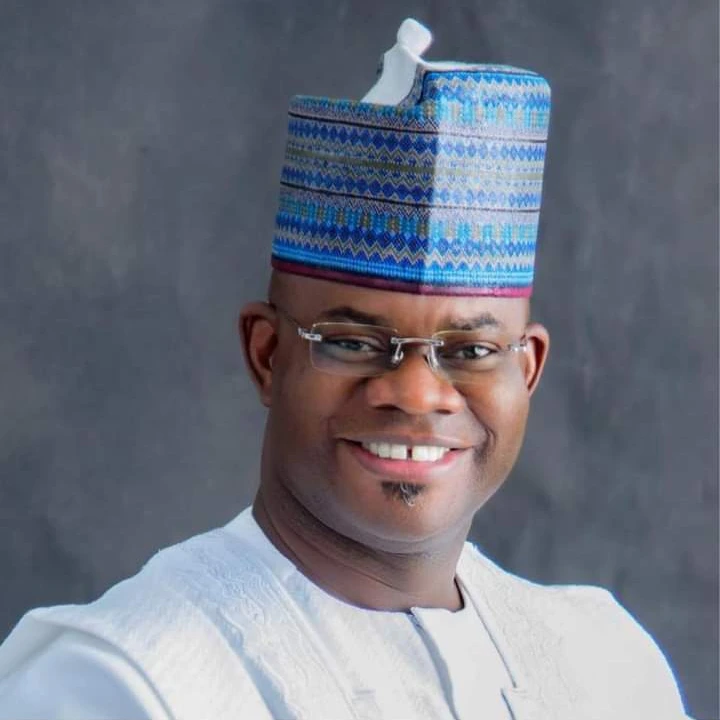

The embattled immediate past Governor of Kogi state, Yahaya Bello, says he would have appeared at the Federal High Court in Abuja to answer to the 19-count charge preferred against him by the Economic and Financial Crimes Commission, EFCC, but is afraid he would be arrested.
Though Bello was absent for his arraignment today April 23, His team of lawyers addressed the court on his behalf.
A member of his legal team, Adeola Adedipe, SAN, had this to say on his behalf;
“The defendant wants to come to court but he is afraid that there is an order of arrest hanging on his head,” Adedipe, SAN, submitted.
Adesipe then appealed to the court to set aside the exparte order of arrest it earlier issued against the former governor. The lawyer contended that as at the time the order of arrest was made, the charge had not been served on his client as required by the law.
He argued that it was only at the resumed proceedings on Tuesday that the court okayed substituted service of the charge on the defendant, through his lawyer.
“As at the time the warrant was issued, the order for substituted service had not been made. That order was just made this morning. A warrant of arrest should not be hanging on his neck when we leave this court,” counsel to the defendant added.
According to him, the Federal Government did not consult the 36 States of the federation before it enacted the EFCC Act through the National Assembly. He argued that section 12 of the 1999 Constitution, as amended, required the various Houses of Assembly of states to ratify the Act before it could become operative.
“This is a very serious matter that borders on the constitution and the tenets of federalism. It has to be resolved because as it stands, the EFCC is an illegal organization,” Bello’s lawyer added
However, EFCC’s lawyer, Mr. Kemi Pinheiro, SAN, urged the court to refuse the application, insisting that the warrant of arrest should not be set aside until the defendant makes himself available for his trial.
News
Nigeria Has Secured $2.25B World Bank Loan With An Interest Rate Of 1% – Minister Of Finance


The minister of Finance and coordinating minister of the economy, Wale Edun has announced that Nigeria has secured a $2.25bn World Bank loan with a 1% interest rate.
While speaking at the annual meetings of the International Monetary Fund (IMF) and World Bank Group on April 20, Edun disclosed that the loan was approved by the board of directors of the World Bank, and offers a 40-year term, a 10-year moratorium, and a one percent interest rate.
He said;
“If you look at the fact that we have qualified for the processing, just this week to the board of directors of the World Bank of a total package of $2.25 billion.
“There is no such thing as a free lunch but it is the closest you can get to free money. It is virtually a grant. It is about 40 years, 10 years moratorium and about one percent interest. That also is part of the flow that you can count.”
He added that Nigeria also secured similar budgetary support and low-interest funding from the African Development Bank (AfDB). Edun said;
“Clearly, there are also ongoing discussions with foreign direct investors. Some of these things take longer than you expect but they are relatively advanced discussions on major foreign direct investments flows into the country, specific transactions with specific companies, institutions, and authorities.”
This news has however stirred different reactions from citizens as not everyone agrees with the idea of Nigeria borrowing money.
-



 Transport4 days ago
Transport4 days agoFederal Government To Launch Out 2700 CNG Buses, Tricycles Ahead Of First anniversary Of Tinubu’s Administration
-



 News4 days ago
News4 days agoNigeria Has Secured $2.25B World Bank Loan With An Interest Rate Of 1% – Minister Of Finance
-

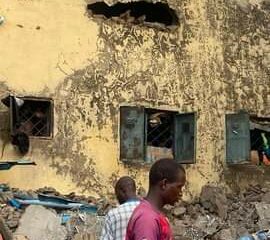

 News22 hours ago
News22 hours agoNiger State Prisoners Run From Facility After Rainstorm Brings Down Part Of Fencing
-



 Tech17 hours ago
Tech17 hours agoAnambra School Emerges Winner In National Girls In ICT Competition With Groundbreaking VR Technology
-

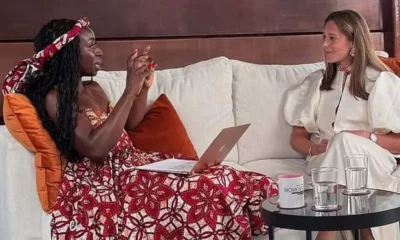

 Spotlight22 hours ago
Spotlight22 hours agoNigerian Woman Breaks Guinness World Record With 55-Hour Interview Marathon
-

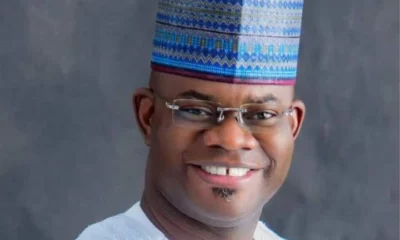

 News3 days ago
News3 days agoEFCC: Former Governor Of Kogi State, Yahaya Bello Fails To Show Up In Court, Says He Is Scared Of Arrest
-



 Finance2 days ago
Finance2 days agoGodwin Emefiele Disobeyed Direction Of Law With Intent To Harm The Public, He Printed ₦684.5M Using ₦18.9B Says EFCC in fresh charge
-

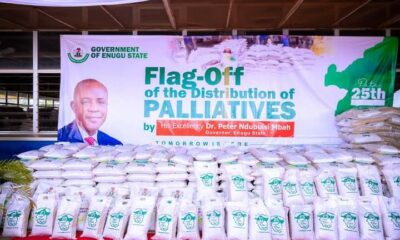

 Politics11 hours ago
Politics11 hours agoEnugu State Government Flag Off Palliative Distribution In The State







